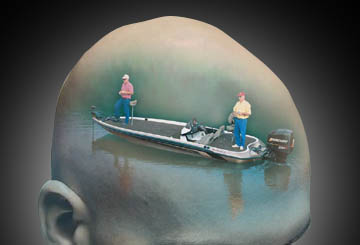Levels of the Game: Focused concentration

Nearly all of the performance-psychology dimensions discussed in this column apply in sports other than competitive fishing. This is nowhere more true than in the domain of focused concentration. The capacity to coordinate many different muscle groups, while paying specific attention to a complex task, is a key to success for racecar drivers, baseball players and many other athletes – certainly tournament anglers.
Continuing the format established last month, described below are beginner-, intermediate- and advanced-level techniques for improving focused concentration. Learn and practice these exercises, and 2009 may be your best tournament season ever!
Beginner level
Even if you are just starting your angling career, you know it’s pretty easy to get distracted out on the water. About a million things can happen that might distract you from focusing on catching and landing fish. One of the first steps to improving concentration is to decide in advance what the most important things are to focus on for this day.
While driving your boat across rough water, for example, thinking about your mom or wondering about what you’re having for dinner aren’t nearly as important as keeping the bow of your boat pointed directly into those 3-foot waves. You are correctly focusing your attention on the main variable that will bring you safely back to the dock. Similarly, when you’re out fishing, there are lots of different things that you could be paying attention to, though only a few key things you should be concentrating on. Unfortunately for most of us, our attention often seems to jump pretty quickly from one thing to the next.
Try this exercise: The next time you go fishing, decide ahead of time what the two or three key variables are that you need to pay attention to that day. Maybe you are just getting used to baitcasting tackle, for example, and you currently spend more time than you should untangling backlashes. To minimize this problem, one key dimension you should focus on is setting the mechanical and magnetic spool adjustments on your reel before you make your first cast with each new bait. If you switch from a crankbait to a spinnerbait, for example, remind yourself to readjust your spool tension setting. Even if you only change from a 1/2-ounce spinnerbait to a 3/8-ounce model, you will need to make minor adjustments in order to avoid those time-consuming “professional overruns.”
(Here is a key tip I learned from Tommy Martin many years ago. You’ve got your reel adjusted for your favorite spinnerbait, right? And you’re going down a bank with the wind at your back, casting effortlessly with no problems. Let’s say you catch a couple of fish and decide to rework that bank. If you’re like me, you’ll just turn the boat around and start casting, only now you’ll be moving into the wind. Before you do that, readjust your reel! There is a guaranteed backlash in that first cast into the wind you can avoid if you do!)
Intermediate level
At this level, you understand the significance of focused concentration, and you are pretty good at sorting what is important from what’s not. In most instances you can stay focused, at least for a time, though sustained concentration is still a challenge. Here’s what you need to do.
First, think about the last few times you went fishing and try to identify the kind of things that typically disrupt your concentration. You might ask one or two of your fishing partners to help you with this exercise. Maybe you are the type of person who is most easily distracted by visual stimuli like shore birds or other anglers or unusual weather/sky patterns. (One of the guys I fish with often misses bites when he is sky-gazing and explaining to me the difference between stratocumulus and cumulus clouds!) Or you may be the kind of person who is most distracted by sounds. If you’re a nice person, for example, you may be inclined to respond to your fishing partner’s questions or to the homeowner on the dock who wants to know how fishing is today, and you may miss bites or key fishing information as a result.
Whatever your typical distractions tend to be, once you have identified them, it will be easier for you to notice these things and redouble your efforts to concentrate when they happen. Many pro anglers I have fished with pointedly tell me to not ask them questions or talk while they are fishing. Some insist on this even on practice days. They know how easy it is to let conversation lead to concentration lapses, and they can ill-afford to miss important information.
Take a look at the typical distractions on your list, and figure out practical steps you can take to minimize or eliminate things that disrupt your focused concentration.
Advanced level
As an advanced student of focused concentration, you have learned to tune out most distractions. In fact, the people who fish with you comment on your ability to consistently tune out external sights and sounds. You are better than most at paying close attention to each presentation, each bait, each target. Still, there are lapses in your focused concentration that you would like to eliminate. Hour after hour of pitching to vegetation clumps or bushes, repeatedly skipping baits under boat docks, or long stretches of deep cranking can lead to a kind of mental fatigue that by itself diminishes concentration. Superhot, windless days will do that to me, and I can wind up in a mental fog that is clearly counterproductive. Here are a couple of techniques that can help.
First, if you know you are going to be using one technique for a long period of time, say pitching jigs to lay-down logs, set the alarm on your watch for 15-minute intervals. The alarm going off will serve as a reminder to maintain your concentration and not get into the mindless routine that diminishes your focus.
You can also practice strengthening your concentration skills away from the lake by choosing to focus on one thing in the midst of multiple distractions. One Wisconsin angler I know goes to shopping centers during the winter, finds the noisiest spot he can, and then sits down and visually practices fishing a jigworm on deep weedlines. “At first I would hear and be distracted by all the conversations nearby,” he told me. “After a while, however, I got to where I could tune out most external noises most of the time. It sure made ignoring other boats and jet skis in the summer a lot easier.” You can also practice this at home by turning on loud music you don’t like while physically pitching plastic worms to a small target across your living room.
Focused concentration, like casting skills or map-reading talent, can be learned and improved through practice. And as every pro will tell you, the better you concentrate, the more fish you’ll catch!

————————————————–
Jay T. McNamara, Ph.D., L.P., also known as Dr. Fish, recently finished his book “The Psychology of Exceptional Fishing.” You can order it by contacting Jay via e-mail at this address: [email protected].
————————————————–
Jay T. McNamara, Ph.D., L.P., is a psychologist, who is also an avid bass and walleye angler. With more than 26 years of professional experience complemented by participation in competitive fishing at local and national levels, he is uniquely qualified to illustrate how performance psychology principles apply to tournament fishing.